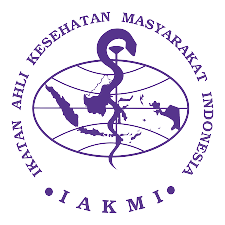THE RELATIONSHIP BETWEEN THE COGNITIVE FACTOR AND SOCIAL ENVIRONMENT WITH HIV/AIDS CHECK-UP ACTIVENESS RATES AMONG CROSS-DRESSERS IN GORONTALO
Abstract
In Gorontalo, the total number of HIV/AIDS cases in June 2021 is 64, and homosexuals occupy the highest position, with 34 patients. The term “homosexuals†is historically used to diagnose medical/mental illnesses, and cross-dresser is an alternative term to replace it. The number of cross-dressers in Gorontalo is around 350. Based on the CDC, an HIV check-up is the first step in getting care, treatment, and controlling the disease for people living with HIV and keeping others safe. The novelty in this study was to see the relationship between cognitive factors and the social environment with HIV/AIDS check-up activeness rates among cross-dressers in gorontalo. This research aims to determine the significant relationship between the cognitive factor and the social environment with the activeness of HIV/AIDS examinations in cross-dressers in Gorontalo, Indonesia. The population is 60 people and the sample is 52 cross-dressers. Independent variables used are the cognitive factor (knowledge and attitude) and social environment (support from fellow cross-dressers), while the dependent variable is the HIV/AIDS check-up activeness rates among cross-dressers. This research found that most of the respondents were cross-dressers aged between 25 and 29 years and participants mostly went to Community Health Center for HIV/AIDS check-ups. However, some participants did not go or find out how to do the HIV/AIDS check-up. The conclusion that cognitive factor (knowledge and attitude) was not associated with HIV/AIDS check-up activeness rates among cross-dresser because they failed to reject the null hypothesis. In comparison, social environment (support from fellow cross-dressers) was associated with HIV/AIDScheck-up activeness rates among cross-dressers because it rejected the null hypothesis.
Keywords
Full Text:
PDFReferences
Clinical Info, HIV Info. GLOSSARY of HIV/AIDS-Related Terms : Offering information on HIV/AIDS treatment, prevention, and research. 9th ed. 2021. 1-202 p. [cited 2022 Jan 10]
Kemenkes RI. Profil Kesehatan Indonesia 2020. Hardhana B, Sibuea F, Widiantini W, editors. Jakarta: Kementerian Kesehatan Republik Indonesia; 2021. [cited 2022 Jan 10]
Dinkes Gorontalo. Hingga Juni 2021, HIV-AIDS di Provinsi Gorontalo Sebanyak 64 Kasus [Internet]. Dinas Kesehatan Provinsi Gorontalo. 2021 [cited 2022 Jan 19]. Available from: https://dinkes.gorontaloprov.go.id/hingga-juni-2021-hiv-aids-di-provinsi-gorontalo-sebanyak-64-kasus/
Prabawanti C, Bollen L, Palupy R, Morineau G, Girault P, Mustikawati DE, et al. HIV, Sexually Transmitted Infections, and Sexual Risk Behavior Among Transgenders in Indonesia. AIDS Behav [Internet]. 2011 Apr 1;15(3):663-73. Available from: http://link.springer.com/10.1007/s10461-010-9790-0
Vaccaro A, August G, Kennedy MS. Queerossary of Terms. In: Safe Spaces: Making Schools and Communities Welcoming to LGBT Youth: Making Schools and Communities Welcoming to LGBT Youth. ABC-CLIO; 2011. p. 142.
Rivera S. Transvestites: Your Half Sisters and Half Brothers of the Revolution. In: Street Transvestite Action Revolutionaries: Survival, Revolt, and Queer Antagonist Struggle. Untorelli Press; 2013. p. 19-20.
M.Kes, Dr. Irwan Skm. Risk Factors For Sexually Transmitted Disease And Hiv/Aids Towards Males Sex Males In Gorontalo City. Int J Heal Sci Med Res [Internet]. 2022 Feb 24;1(1):18-26. Available from: https://ejurnal.ung.ac.id/index.php/ihsmr/article/view/9280
Wiratama RB, Handayani S, Soetjipto S. Factors Related To The Incidence Of Hiv/Aids Among Shemale In Surabaya, Indonesia. Maj Biomorfologi [Internet]. 2020 Sep 3;30(2):59. Available from: https://e-journal.unair.ac.id/MBIO/article/view/21814
CDC. HIV Testing [Internet]. Centers for Disease Control and Prevention. 2017 [cited 2022 Jan 10]. Available from: https://www.cdc.gov/vitalsigns/hiv-testing/
Petros P. Risk perception, HIV/AIDS related knowledge, attitude and practice of the university community: The case of Ethiopian Civil Service College. HIV AIDS Rev [Internet]. 2014;13(1):26-32. Available from: https://linkinghub.elsevier.com/retrieve/pii/S1730127014000022
Dzah SM, Tarkang EE, Lutala PM. Knowledge, attitudes and practices regarding HIV/AIDS among senior high school students in Sekondi-Takoradi metropolis, Ghana. African J Prim Heal Care Fam Med [Internet]. 2019 May 9;11(1). Available from: http://www.phcfm.org/index.php/PHCFM/article/view/1875
Nyoko YO, Hara MK. Knowledge and Attitudes with HIV/AIDS on Adolescent Behavior in Senior High School. J Kesehat Masy [Internet]. 2020 Jul 27;16(1):28-35. Available from: https://journal.unnes.ac.id/nju/index.php/kemas/article/view/19928
Wulandari S, Viridula EY, Wijayanti A, Anggraini D. Knowledge, Attitudes, and Behavior of Pregnant Women about HIV Screening. J Qual Women's Heal [Internet]. 2022 Apr 7;5(1):136-40. Available from: https://jqwh.org/index.php/JQWH/article/view/149
Halim Y, BM S, Kusumawati A. Faktor-faktor yang Berhubungan dengan Perilaku Ibu Hamil dalam Pemeriksaan HIV di Wilayah Kerja Puskesmas Halmahera Kota Semarang. J Kesehat Masy. 2016;4(5):395-405.
Djan D. Factors Affecting the Attitude of Young People towards HIV Testing Uptake in Rural Ghana. J HIV Retro Virus [Internet]. 2018;04(02). Available from: http://hiv.imedpub.com/factors-affecting-the-attitude-of-young-people-towards-hiv-testing-uptake-in-rural-ghana.php?aid=23148
Ryan S, Hahn E, Rao A, Mwinnyaa G, Black J, Maharaj R, et al. The impact of HIV knowledge and attitudes on HIV testing acceptance among patients in an emergency department in the Eastern Cape, South Africa. BMC Public Health [Internet]. 2020 Dec 6;20(1):1066. Available from: https://bmcpublichealth.biomedcentral.com/articles/10.1186/s12889-020-09170-x
Vargas-Sánchez A, Plaza-MejÃa MÃ, Porras-Bueno N. Attitude. In: Jafari J, Xiao H, editors. Encyclopedia of Tourism [Internet]. Cham: Springer International Publishing; 2016. p. 58-62. Available from: http://link.springer.com/10.1007/978-3-319-01384-8_11
Sofro MAU, Hidayanti E. Social support for housewives with HIV/AIDS through a peer support group. Psikohumaniora J Penelit Psikol [Internet]. 2019 Apr 30;4(1):77. Available from: http://journal.walisongo.ac.id/index.php/Psikohumaniora/article/view/3378
Logie CH, Wang Y, Lacombe-Duncan A, Wagner AC, Kaida A, Conway T, et al. HIV-related stigma, racial discrimination, and gender discrimination: Pathways to physical and mental health-related quality of life among a national cohort of women living with HIV. Prev Med (Baltim) [Internet]. 2018 Feb;107:36-44. Available from: https://linkinghub.elsevier.com/retrieve/pii/S0091743517305054
Tran BX, Phan HT, Latkin CA, Nguyen HLT, Hoang CL, Ho CSH, et al. Understanding Global HIV Stigma and Discrimination: Are Contextual Factors Sufficiently Studied? (GAPRESEARCH). Int J Environ Res Public Health [Internet]. 2019 May 29;16(11):1899. Available from: https://www.mdpi.com/1660-4601/16/11/1899
Yuliastiana Yulistiana, Kadar I, Istiadi Y. Hubungan Antara Peta Kognitif dan Persepsi Lingkungan dengan Perilaku Siswa yang Berwawasan Lingkungan (Survey Pada Siswa Kelas XI SMA Negeri Se-Jakarta Timur). J Pendidik Lingkung Hidup. 2017;5(2):6-10.
Setia M. Methodology series module 3: Cross-sectional studies. Indian J Dermatol [Internet]. 2016;61(3):261. Available from: http://www.e-ijd.org/text.asp?2016/61/3/261/182410
Jusuf H, Adityaningrum A, Yunus R. DETERMINAN KEJADIAN GASTRITIS PADA MAHASISWA. Jambura Heal Sport J [Internet]. 2022 Aug 29;4(2):108-18. Available from: https://ejurnal.ung.ac.id/index.php/jhsj/article/view/15171
Sari NPWP, Parut AA. HIV/AIDS-Related Knowledge and Willingness to Participate in Voluntary Counseling and Testing among Health Sciences University Students. J Ners [Internet]. 2019 Mar 27;13(2):162-70. Available from: http://localhost/demo3309/index.php/JNERS/article/view/6716
Weldegebreal F, Abdurahman S, Seyoum B, Oljira L. Factors affecting acceptance of provider-initiated HIV testing and counseling services among outpatient clients in selected health facilities in Harar Town, Eastern Ethiopia. HIV/AIDS - Res Palliat Care [Internet]. 2015 May;157. Available from: http://www.dovepress.com/factors-affecting-acceptance-of-provider-initiated-hiv-testing-and-cou-peer-reviewed-article-HIV
Haffejee F, Maughan-Brown B, Buthelezi T, Kharsany ABM. Perceived HIV-related stigma among university students in South Africa: implications for HIV testing. African J AIDS Res [Internet]. 2018 Apr 3;17(2):109-18. Available from: https://www.tandfonline.com/doi/full/10.2989/16085906.2018.1439512
Golub SA, Gamarel KE. The Impact of Anticipated HIV Stigma on Delays in HIV Testing Behaviors: Findings from a Community-Based Sample of Men Who Have Sex with Men and Transgender Women in New York City. AIDS Patient Care STDS [Internet]. 2013 Nov;27(11):621-7. Available from: http://www.liebertpub.com/doi/10.1089/apc.2013.0245
Brent RJ. The value of reducing HIV stigma. Soc Sci Med [Internet]. 2016 Feb;151:233-40. Available from: https://linkinghub.elsevier.com/retrieve/pii/S0277953616300144
Ahmed SI, Syed Sulaiman SA, Hassali MA, Thiruchelvam K, Hasan SS, Lee CK. Attitudes and barriers towards HIV screening: A qualitative study of people living with HIV/AIDS (PLWHA) in Malaysia. J Infect Prev [Internet]. 2017 Sep 1;18(5):242-7. Available from: http://journals.sagepub.com/doi/10.1177/1757177416689723
Ssekankya V, Githaiga SK, Aleko T, Munguciada EF, Nabakka VP, Kyalisiima JJ, et al. Factors Influencing Utilization of HIV Testing Services among Boda-Boda Riders in Kabarole District, Southwestern Uganda: A Cross-Sectional Study. Ekwunife OI, editor. Biomed Res Int [Internet]. 2021 Apr 2;2021:1-8. Available from: https://www.hindawi.com/journals/bmri/2021/8877402/
Harris MA, Orth U. The link between self-esteem and social relationships: A meta-analysis of longitudinal studies. J Pers Soc Psychol [Internet]. 2020 Dec;119(6):1459-77. Available from: http://doi.apa.org/getdoi.cfm?doi=10.1037/pspp0000265
Krauss S, Orth U, Robins RW. Family environment and self-esteem development: A longitudinal study from age 10 to 16. J Pers Soc Psychol [Internet]. 2020 Aug;119(2):457-78. Available from: http://doi.apa.org/getdoi.cfm?doi=10.1037/pspp0000263
Jerald M, Honey Me V. Number Of Friends In School And The Level Of Self-Confidence Of The Students. Int J Res -Granthaalayah [Internet]. 2020 Jun 6;8(1):277-86. Available from: https://www.granthaalayahpublication.org/journals/index.php/granthaalayah/article/view/30_IJRG20_B02_3058
Bateganya MH, Amanyeiwe U, Roxo U, Dong M. Impact of Support Groups for People Living With HIV on Clinical Outcomes. JAIDS J Acquir Immune Defic Syndr [Internet]. 2015 Apr 15;68(Supplement 3):S368-74. Available from: https://journals.lww.com/00126334-201504151-00013
Alem AT, Sisay MM, Alemayehu AM. Factors Affecting Voluntary HIV/AIDS Counseling and Testing Service Utilization Among Youth in Gondar City, Northwest Ethiopia. HIV/AIDS - Res Palliat Care [Internet]. 2020 Nov; Volume 12:667-73. Available from: https://www.dovepress.com/factors-affecting-voluntary-hivaids-counseling-and-testing-service-uti-peer-reviewed-article-HIV
DOI: https://doi.org/10.37905/ijhsmr.v2i1.16412
Refbacks
- There are currently no refbacks.









